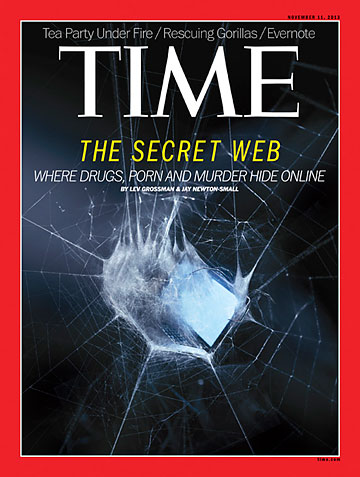
(7 of 8)
The FBI isn't the only agency that's worried about the Deep Web. The Senate Finance Committee is looking at beefing up the IRS' funding for dealing with virtual currencies and investigating potential tax shelters, Senate sources say. Bitcoin presents Washington with a whole set of regulatory challenges all on its own. Is Bitcoin a currency? (Under certain definitions, no, because it isn't legal tender issued by a country.) Is it a commodity? Should bitcoin traders be regulated as banks or wire services?
CRACKDOWN
The incarceration of ross Ulbricht started a spreading wave of arrests of suspected Deep Web dealers. On Oct. 8, police in Sweden arrested two men on charges of selling pot through Silk Road, and four more men were picked up in the U.K. the same day on drug charges. "These arrests send a clear message to criminals," said Keith Bristow, head of Britain's National Crime Agency. "The hidden Internet isn't hidden, and your anonymous activity isn't anonymous. We know where you are, what you are doing, and we will catch you."
It's not completely clear that that's true. One of the documents leaked by Snowden was an NSA presentation dated June 2012 titled "Tor Stinks." It described the difficulties the NSA has been having cracking Tor, and it said definitively, "we will never be able to de-anonymize all Tor users all the time." The Deep Web template that Ulbricht created remains technically sound. As one former Silk Road user puts it, "The dust has settled and everyone is kind of like 'Oh, well, time to order some more drugs.' We all knew it was coming." There are forum posts discussing the possibility of a reconstituted Silk Road, based on a backed-up version of the old site but with added security, that could launch on Nov. 5. "This will be where the action is once it's up and running," says the user.
Tor itself is left in the curious position of being funded by some parts of the federal government (including the State Department and the Department of Defense) while others (the FBI and the NSA) are trying to crack it. But even law-enforcement officials directly involved with the case hasten to clarify that they don't blame the technology itself for Silk Road. "There's nothing inherently wrong with anonymity on the Internet," U.S. Attorney Bharara says. "There's nothing inherently wrong with certain kinds of currency, like bitcoins. Just like there's nothing inherently wrong with cash. But it happens to be the case that ... it's also the thing that allows the drug trade to flourish. It allows money laundering to happen. It allows murder for hire to happen."
What's certain is that the need for Tor--or something like it--isn't going away. The Internet is becoming an increasingly unprivate place, where multibillion-dollar business plans are being built on companies' ability to observe and rapaciously harvest every last iota and fillip of consumer behavior. More and more, it falls to consumers themselves to say where the line is and to take control of their personal information.
